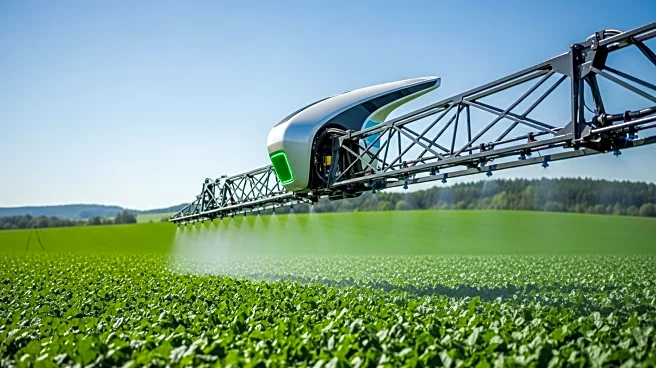What is the story about?
What's Happening?
Bayer has announced the development of icafolin-methyl, a new herbicide designed to complement glyphosate rather than replace it. According to Dr. Volker Kuehnhold from Bayer Crop Science, icafolin-methyl aims to restore the control farmers initially had with glyphosate, addressing the growing issue of weed resistance. Icafolin-methyl belongs to a new chemical class that allows for lower dose rates and more targeted applications, promising an exceptional safety and sustainability profile. Bayer has submitted registration applications for icafolin-methyl in the European Union, Brazil, the US, and Canada, with a launch expected in 2028 starting in Brazil. The herbicide works by freezing weeds, leaving them as a mulch layer that prevents re-emergence and aids in soil conservation.
Why It's Important?
The introduction of icafolin-methyl is significant as it addresses the increasing challenge of weed resistance, which threatens no-till farming systems that offer environmental benefits. By complementing glyphosate, icafolin-methyl provides farmers with a new tool to manage weeds effectively, potentially extending the useful life of existing herbicides. This development aligns with Bayer's strategy to advance regenerative agriculture technologies, offering solutions that optimize environmental impact. The herbicide's ability to create a mulch layer could also help prevent soil erosion and retain moisture, contributing to sustainable farming practices.
What's Next?
Bayer is progressing with regulatory submissions for icafolin-methyl, anticipating faster approval timelines than previously experienced. The company expects to launch the herbicide in Brazil by 2028, with potential earlier registration in 2027. As regulatory processes advance, Bayer aims to educate farmers on the benefits and application methods of icafolin-methyl, ensuring its effective integration into existing weed management strategies. The success of icafolin-methyl could influence future herbicide development, emphasizing the need for precision solutions that balance efficacy with environmental considerations.
Beyond the Headlines
The development of icafolin-methyl highlights the ongoing evolution in agricultural practices, where precision and sustainability are increasingly prioritized. As weed resistance continues to challenge traditional herbicides, innovations like icafolin-methyl may set a precedent for future crop protection products. The focus on creating a mulch layer that aids soil health reflects a broader shift towards regenerative agriculture, which seeks to enhance ecosystem resilience while maintaining productivity. Bayer's approach may encourage other agribusinesses to invest in similar technologies, potentially transforming the landscape of weed management.















